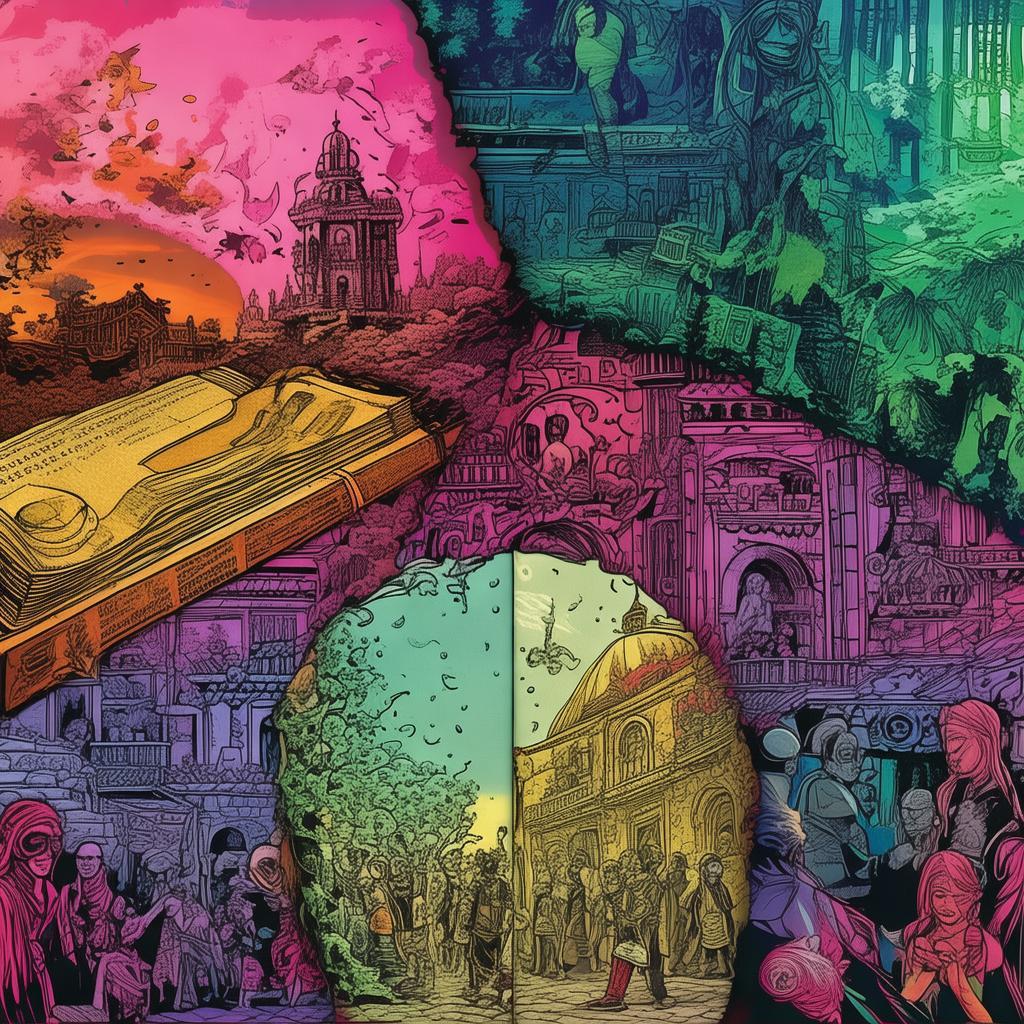The Enigma of the Vanishing Gardeners
In the heart of the gloomy, misty English countryside, stood the sprawling, dilapidated estate of the Vanishing Gardens. Whispers of its haunted past had echoed through the village for generations, but no one dared to approach its foreboding gates. That is, until the day a young scholar named Eliza stumbled upon an old, tattered journal in the local library.
The journal belonged to an eccentric gardener named Sir Cedric Blackwood, who had vanished without a trace during the 1800s. The journal detailed his love for the gardens and his obsession with creating the perfect botanical haven. But as Eliza delved deeper, she discovered that Sir Cedric's story was far more sinister than she could have ever imagined.
The gardens, it seemed, were cursed. Workers would appear and disappear without a trace, leaving behind only their tools and rags. No one had ever returned, and the estate was shrouded in a perpetual twilight. Eliza became consumed by the mystery, determined to uncover the truth behind the vanishing gardeners.

Determined to solve the enigma, Eliza ventured into the estate one crisp autumn evening. The air was thick with the scent of decaying leaves and the sound of wind rustling through the old trees. As she stepped inside, she felt a chill run down her spine. The house was decrepit, its walls peeling and its floors creaking under her weight.
Eliza's exploration led her to a hidden greenhouse, its windows shattered and its interior overgrown with ivy. Inside, she found a small, weathered desk with a single drawer. With trembling hands, she opened the drawer and pulled out a series of photographs and letters. The photographs depicted Sir Cedric with various workers, each one looking happier and more carefree than the last. The letters were from Sir Cedric to a woman, a woman who appeared to be Eliza's own ancestor.
In the letters, Sir Cedric spoke of his love for the gardens and his admiration for the workers. He expressed his desire to create a perfect union between nature and humanity, but his words were tinged with a madness that Eliza could not quite understand. It was then that she noticed a small, ornate locket among the photographs. The locket contained a portrait of a woman, strikingly similar to her own features.
Suddenly, Eliza felt a presence behind her. She turned to see a shadowy figure standing in the doorway. The figure wore an old gardener's cloak and carried a trowel. Eliza's heart raced as she realized that it was one of Sir Cedric's vanished workers.
"Who are you?" Eliza stammered, her voice barely above a whisper.
The worker's eyes, dark and hollow, met hers. "I am the keeper of the gardens. You must leave now, young one. The curse is not for the living to uncover."
Eliza tried to run, but the worker was fast. He grabbed her arm and pulled her back into the greenhouse. "You have no idea what you have unleashed," he hissed. "The gardens are not for the living. They are for the dead."
As Eliza struggled, the worker's grip tightened. She looked into his eyes one last time, seeing a reflection of her own fear. And then, just as suddenly as he had appeared, the worker vanished.
Eliza stumbled backward, her legs weak. She realized that she was no longer in the greenhouse. Instead, she was standing in the middle of a field, surrounded by the remnants of the once-magnificent gardens. The plants were dead, the soil barren. The curse had been lifted, but at a terrible cost.
Eliza returned to the village, her mind racing with questions. She knew that the locket contained a secret, a connection to her ancestor and the cursed gardens. Determined to uncover the truth, she sought out the local historian, hoping to find answers in the records of the Vanishing Gardens.
The historian, an elderly man with a long, white beard, listened intently to Eliza's story. "The Blackwood family," he said, "had a dark secret. Sir Cedric was not obsessed with nature, but with death. He performed experiments on the workers, attempting to merge their souls with the plants. The curse was his creation, a punishment for his monstrous deeds."
Eliza's heart sank. She realized that the workers were not vanishing, but being transformed into something else. They were victims of Sir Cedric's twisted desires, trapped in an eternal twilight.
The historian continued, "But there is hope. The locket contains the key to breaking the curse. It was created by a wise woman, a friend of Sir Cedric's, who wanted to save the workers. She imbued the locket with her own soul, promising to protect them until the curse could be lifted."
Eliza held the locket in her hand, feeling the warmth of the woman's spirit. She knew that she had to find a way to break the curse and free the workers from their eternal twilight. She set out on a journey, visiting old cemeteries, reading ancient texts, and seeking the help of others who had been affected by the curse.
Years passed, and Eliza's determination never wavered. She faced countless obstacles, but her love for the workers and her resolve to break the curse kept her going. Finally, she discovered a ritual that would free the workers and lift the curse from the gardens.
On the eve of the ritual, Eliza stood in the heart of the vanishing gardens, the moonlight casting eerie shadows across the once-bustling landscape. She held the locket close, feeling the woman's spirit within it. As she recited the ancient words, the air around her grew charged with energy.
The workers, now ethereal figures, emerged from the shadows, their faces etched with gratitude. They surrounded Eliza, thanking her for her bravery and sacrifice. One by one, they faded away, their spirits freed from the curse.
Eliza looked around the now-bustling gardens, her heart filled with a sense of triumph. The vanishing gardeners were gone, but the curse had been lifted, and the gardens had been reborn. She knew that she had made a difference, that she had given the workers a second chance at life.
As Eliza walked away from the vanishing gardens, she couldn't help but feel a sense of peace. She had uncovered the truth behind the curse, but more importantly, she had found a purpose greater than herself. The enigma of the vanishing gardeners had changed her life forever, but she knew that it was only the beginning of her journey.
✨ Original Statement ✨
All articles published on this website (including but not limited to text, images, videos, and other content) are original or authorized for reposting and are protected by relevant laws. Without the explicit written permission of this website, no individual or organization may copy, modify, repost, or use the content for commercial purposes.
If you need to quote or cooperate, please contact this site for authorization. We reserve the right to pursue legal responsibility for any unauthorized use.
Hereby declared.









